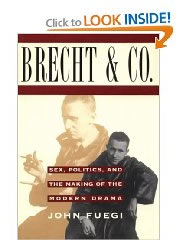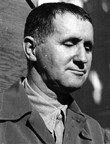| |

  |
| Brecht ve Kumpanya: Seks, Politika, ve Modern[ist] Tiyatronun Yapımı |
 |
John Feugi'ye göre:
1) Brecht en yakın çalışma arkadaşlarını ve sevgililerini düzenli olarak aldattı, onların çalışmalarını kendi adı altında yayınladı;
2) servetini gizil banka hesaplarında saklayarak Komünist proleterya pozuna girdi;
3) şiirlerinden, öykülerinden ve şarkılarından ve en ünlü oyunlarından pekçoğu sevgilisi Elisabeth Hauptmann taraufından yazıldı. "Üç Kuruşluk Opera" hemen hemen bütünüyle Hauptmann'ın ürünüydü.
 |
Brecht and Company: Sex, Politics, and the Making of the Modern Drama (Hardcover)
by John Fuegi (Author)
"In 1899, a photographer whose work proudly bears the coat of arms of the Royal Bavarian Court in Munich captured a small fragment of that..." (more) |
From Publishers Weekly
Bertolt Brecht, according to this gripping, myth-shattering biography, regularly cheated his closest co-workers and lovers, publishing their literary works under his own name and concealing his wealth in secret bank accounts while posing as a penurious Communist proletarian. Many of Brecht's poems, stories and songs, plus huge sections of some of his most famous plays, were written by his lover Elisabeth Hauptmann, declares Fuegi, who bases his sensational charges on surviving manuscripts, interviews with members of Brecht's circle, contemporaneous diaries and contracts. The Threepenny Opera , he concludes, was almost exclusively the work of Hauptmann, who silently endured Brecht's exploitation, hoping he would divorce his wife and marry her. Professor of Germanic and Slavic literature at the University of Maryland and author of two previous studies on Brecht, Fuegi further argues that substantial unacknowledged contributions to other famous Brecht plays were made by two of his mistresses. Terrified of abandonment and of emotional involvement, Brecht, in Fuegi's scathing portrait, continually played his multiple lovers against one another. The author deduces that Brecht was bisexual and, from his late teens to mid-20s, preoccupied with homosexuality. A founder of the International Brecht Society, Fuegi presents Brecht as a shrewd manipulator, with close friends on both the left and the radical right, who made puny contributions to the anti-Hitler effort until the Nazis took away his German citizenship, and who remained silent while Stalin persecuted his friends in the Soviet Union. Fuegi's brilliant, graphic portrait of Brecht and his circle is certain to spark controversy. Photos not seen by PW.
Copyright 1994 Reed Business Information, Inc.
|
 |
From Library Journal
Fuegi, a major Brecht scholar, has been compiling this book since the middle 1960s. The result is a detailed, thoroughly researched critical biography of an icon of modern drama. Its revisionist view meticulously portrays the famed poet/playwright as an exploiter and thief of the work of his closest friends, lovers, and collaborators, especially such women as Elizabeth Hauptmann and Ruth Berlow. It has long been suspected-but until now inadequately documented-that Brecht made a career out of artistic parisitism. Perhaps new editions/translations of Brecht will now have to carry the names of several authors. This book will be controversial and corrective, but it will also generate much new and important work in Brecht studies. For most serious theater collections.
Thomas E. Luddy, Salem State Coll., Mass.
Copyright 1994 Reed Business Information, Inc.
|
 |
From Booklist
Bertolt Brecht is generally regarded as one of the greatest twentieth-century authors, whose plays revolutionized dramatic practice, whose poems are widely anthologized, and whose Communist sympathies and residence in post-World War II East Berlin made him a cultural icon for Marxists worldwide. Fuegi aims to change Brecht's status. He believes Brecht wrote very little in the dramas that made him famous; rather, he systematically plagiarized and "collaborated" with lovers and colleagues by signing his name to plays they essentially wrote. Indeed, Fuegi's Brecht is a thoroughly disreputable character, an authoritarian monster of greed and egoism who enslaved others with his charisma, exploited them ruthlessly, then, with no warning, abandoned them, often to conditions of desperate want. Fuegi's massive effort examines every aspect of Brecht's career and personality, and ranges from his childhood in Augsburg through his early successes and his exile to his return to East Germany. If Fuegi's representation, certain to be controversial, is even partially correct, then, for instance, what was deemed the drama of Brecht becomes the drama of Brecht, Elizabeth Hauptmann, Ruth Berlau, and Grete Steffin. Fuegi is persuasive, but only subsequent scholarship can confirm his thesis. John Shreffler |
 |
From Kirkus Reviews
Emulating the breadth characteristic of the epic theater, Fuegi (Germanic & Slavic Lit./Univ. of Maryland) determines that Brecht's theater wasn't really Brecht's theater after all and that Brecht himself, that rather heroic figure of 20th-century drama, was, in fact, a pig of a human being. A misogynist, a liar, and a thief, Bertolt Brecht used and misused people on all sides. Possessed of mesmeric powers that the author compares to those of Hitler, Brecht had no difficulty seducing any number of men and women who would meet his literary as well as his sexual needs. In time, he produced five children by as many women and saw at least a half dozen more offspring aborted. A good deal of his energy seems to have been spent juggling multiple relationships, which Fuegi recounts in great detail to somewhat numbing effect. The most fascinating segments of this hefty volume are those that tell the stories behind Brecht's most famous works. The Threepenny Opera emerges as primarily the work of Elizabeth Hauptmann (Brecht's long-term sometime lover) and Kurt Weill, with final touches by Brecht, all fused together during a volatile journey toward opening night. Similarly, Mother Courage was the product of the conflicting voices of Brecht and Margrete Steffin (another lover), a combination that Fuegi openly admires as resulting in a resonance and insight that neither writer could have accomplished alone. In any case, such revelations inspire the reader to return to the plays themselves for reexamination. Finally, these theatrical tales are set against the political backdrop of the times: the rise of Hitler (whom we meet as an unemployed scenic designer) and encounters with the watchful eyes of J. Edgar Hoover, the FBI, and the HUAC. A painstakingly researched, if sometimes ploddingly written, work that effectively weaves together the disparate threads that went into the theater we equate with the name Brecht. -- Copyright ©1994, Kirkus Associates, LP. All rights reserved. |
| |
Biography of Bertolt Brecht (1898-1956)
Brecht's own sex life is fascinating in many ways. He is thought to have had no fewer than three mistresses at any time throughout his adult life. ... Between sixteen and twenty he apparently pursued eight girls simultaneously, including Paula Banholzer, the woman who gave birth to his illegitimate child in 1919. |
 |
Bertolt Brecht was born on February 10, 1898, in the medieval city of Augsburg, part of the Bavarian section of the German Empire. Married in 1897, his father was a Catholic and his mother a Protestant. Brecht was their first child, baptized as Eugen Bertolt Friedrich Brecht. His father, Bertolt Friedrich Brecht, worked in a paper factory. His mother, Wilhelmine Friederike Sophie Brezing, was ill with breast cancer most of his young life. He had one brother, Walter, who was born in 1900.
Brecht was a sickly child, having a congenital heart condition and a facial tic. As a result he was sent to a sanitarium to relax. At age six he attended a Protestant elementary school (Volksschule) and at age ten a private school, The Royal Bavarian Realgymnasium (Koeniglich-Bayerisches Realgymnasium). Like most students, he was educated in Latin and the humanities, later being exposed to Nietzsche and other thinkers. He suffered a heart attack at the age of twelve but soon recovered and continued his education.
Significantly, Brecht was exposed at a young age to Luther's German translation of the Bible, a text considered instrumental in the development of the modern German language. Quotes from and references to the Bible abound throughout Brecht's work and can be found most particularly in Mother Courage and Her Children in the mouth of the chaplain.
While in school he began writing, and he ended up co-founding and co-editing a school magazine called The Harvest . By age sixteen he was writing for a local newspaper and had written his first play, The Bible , about a girl who must choose between living and dying but saving many others. He was later almost expelled at age eighteen for dissenting about it being necessary to defend his country in time of war. By nineteen he had left school and started doing clerical work for the war, prevented from more active duty due to health problems.
In 1917 he resumed his education, this time attending Ludwig Maximilian Universitaet in Munich, where he matriculated as a medical student. By this time his mother was heavily drugged with morphine as a result of her progressing cancer. He started to write Baal at this time, a play concerned with suffering caused by excessive sexual pleasures. It sensationally depicted what were considered immoral attitudes at the time.
Brecht's own sex life is fascinating in many ways. He is thought to have had no fewer than three mistresses at any time throughout his adult life. When he was a child, the family's second servant, Marie Miller, would hide objects in her undergarments for Brecht and his brother to search for. Through Brecht's poetry we understand that his mother used to smell his clothes to determine the extent of his sexual activities. By the age of sixteen he began to frequent a brothel as part of a conscientious effort to broaden his experiences. Between sixteen and twenty he apparently pursued eight girls simultaneously, including Paula Banholzer, the woman who gave birth to his illegitimate child in 1919. He is known to have experimented with homosexuality, often inviting literary and musically inclined male friends to his room on weekends in order for them to read erotic compositions. His diaries, although vague, mention his need for both males and females to fulfill his sexual desires. Brecht's desire for experience was, throughout his life, all-consuming.
In 1921 he took his second trip to Berlin and attended the rehearsals of Max Reinhardt and other major directors. In 1922 his play Drums in the Night opened in Munich at the Kammerspiele and later at the Deutsches Theater in Berlin. He received the prestigious Kleist prize for young dramatists as a result. Brecht also entered into his first committed relationship, his marriage with the opera singer Marianne Zoff, at the age of twenty-four. Their daughter Hanne was born the following year. Despite being married, Brecht had extramarital affairs and spent very little time with his wife or daughter. In 1923 his two plays Jungle of Cities and Baal were performed.
After moving to Berlin in 1924, he met a communist Viennese actress, Helene Weigel. His wife Marianne moved in with her parents after the birth of Hanne, and soon she stopped responding to Brecht's letters. At age twenty-six Brecht fathered his second illegitimate child, with Weigel. Their son was named Stefan. Brecht divorced Marianne Zoff and in 1929 married Helene Weigel. At this point he was just thirty-one.
Helene Weigel gave birth to their second child, Barbara, in 1930. During this time Brecht was by no means monogamous. He was obsessed with the idea of abandonment, and as a result he abhorred ending relationships. The women in his life were important for his writing career, and modern feminist detractors often try to claim that his mistresses in fact wrote much of what he takes credit for. The allegation is largely untrue. But women such as Elisabeth Hauptmann did write significant parts of The Threepenny Opera , and other mistresses included Margarete Steffin, who helped him write The Good Woman of Sezuan and Mother Courage and Her Children; Hella Wuolijoki, who allowed him to transform her comedy The Sawdust Princess into Herr Puntila and His Man Matti ; and Ruth Berlau, who at least bore him a short-lived, third illegitimate child in 1944. Weigel was tolerant of his affairs, and she even warned other men to stay away from his mistresses on account of it upsetting him when they made their moves.
Brecht's writings show the profound influence of many varied sources during this time and the remaining years of his life. He studied Chinese, Japanese, and Indian theatre, focused heavily on Shakespeare (adapting, among other plays, Shakespeare's Coriolanus ) and other Elizabethans, and was fascinated by Greek tragedy. He found inspiration in other German playwrights, notably Buchner and Wedekind, and he enjoyed the Bavarian folk play. Mother Courage and Her Children arguably owes much to Schiller's Wallenstein trilogy. Brecht had a phenomenal ability to take elements from these seemingly incompatible sources, combine them, and convert them into his own works.
In 1933 Brecht took his family and fled to Zurich after the burning of the Reichstag, later moving around the world to escape Nazi rule. In October 1947, during the McCarthy years, Brecht was called to appear before the House Committee on Un-American Activities. Although not an official member of America's communist party, Brecht left the United States for Switzerland the next day. He soon reunited with Helene Weigel, and they traveled to East Berlin in 1948 and set up the Berliner Ensemble with full support from the communist regime. Mother Courage and Her Children was the Berliner Ensemble's inaugural production. In 1950, Brecht and Weigel were granted Austrian citizenship.
Brecht's four great plays were written between 1938 and 1945. These included, for one, The Life of Galileo , which followed history all too slavishly. It dealt with the protagonist's self-hatred for giving up his convictions in the face of the Inquisition. The others were Mother Courage and Her Children; The Good Person of Sezuan , which in some ways follows from Mother Courage in examining the compatibility of virtue and a capitalist world; and The Caucasian Chalk Circle , which introduces questions about power and who is entitled to own things. After this period, Brecht worked on his famous adaptation of Antigone and spent much of his energy recording his theoretical ideas.
Brecht experimented with dada and expressionism in his early plays, but he soon developed a unique style which suited his own vision. He detested "Aristotelian" drama and the manner in which it (at least from his point of view) made the audience identify with the hero without enough analysis of the hero's flaws. To him, when such drama produced feelings of terror and pity and led to an emotional catharsis, the process prevented audience members from thinking. (It is the ancient quarrel between philosophers and poets once again, with another thinker trying to reform poetry.) Determined to destroy what he took to be theatrical illusions, Brecht made his dreams into realities when he took over the Berliner Ensemble. In one of his early productions, he famously put up signs which said, "Glotzt nicht so romantisch!" (Don't stare so romantically!). For further information, see About Epic Theatre in the ClassicNote on Mother Courage and Her Children.
Brecht received the National Prize, first class, in 1951. In 1954 he won the international Lenin Peace Prize. Brecht died of a heart attack on August 14, 1956, while working on a response to Samuel Beckett's absurdist play Waiting for Godot , written the year before. Even at the end, Brecht was very much interested in the modern drama of the day. He provided instructions that a stiletto be placed in his heart and that he be buried in a steel coffin so that his corpse would not be riddled with worms. He also left a will giving the proceeds of his various works to particular mistresses, including Elisabeth Hauptmann and Ruth Berlau. Unfortunately for them, the will lacked the necessary witness signatures and was therefore considered void. His widow, Helene Weigel, generously gave small amounts of money to the specified women. Brecht is buried in the Dorotheenfriedhof in Berlin. |
|
|

|
| Avrupa Birliği özgürleşmenin kazanılan ereğidir, çünkü özgürlük insanlığı kültürel ayrımların ötesine ve üzerine, tek bir Yasaya, tek bir Anayasaya, tek bir Türeye, evrensel Türeye ve evrensel Hakka yükselten değişimin biricik olanağıdır. Onda çok-kültürlülük değişmeyen geleneğin, karakteri tutuculuk olan despotizmin, karakteri şiddet olan ideolojinin artıkları olarak postmodern komedyenlerin umutsuz savunusuna terkedilmiştir. Avrupa Birliği modern insanlık gerçek egemenliğine, özgür İstencinin egemenliğine yürüyüşünde Dünya-Tininin ilk adımıdır. |
|
|